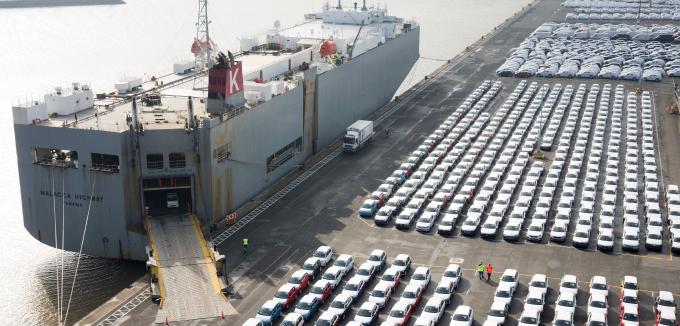DPA
Export cars in the port of Emden: The production of motor vehicles in Germany declined by around 7 percent in the second half of 2018
German carmakers and suppliers have seen significant declines in production over the past year. As reported by the Federal Statistical Office on Tuesday, the production of motor vehicles and motor vehicle parts in the second half of 2018 was 7.1% lower than in the first half of the year due to calendar and seasonal factors. For comparison: In the entire manufacturing sector in Germany, production fell by 2.0 percent over the same period.
Due to its size and its interconnectedness, the car industry in Germany “is of considerable significance for the overall economic development,” explained the Federal Office on the occasion of the Motor Show Techno Classica Essen. Excluding the automotive sector, the decline in production in the manufacturing sector would have been only 0.9 percent.
According to national accounts, in 2016 the automobile industry achieved an economic output of 134.9 billion euros – a share of 4.7 percent of total gross value added in Germany.
One reason for the decline in production last year is the conversion to the new WLTP exhaust gas test standard. This has been valid for all new cars in the EU since September. However, many car makers did not lag behind with the certification of their cars, so in September the new car market collapsed across the EU.
Mercedes sales continue to decline – China on the other hand with growth
The weak trend is also evident among the leading car brands in Germany. The car sales of Daimler’s private label Mercedes-Benz continues to weaken. In March, global sales slumped compared to the same month last year by 4.1 percent to 227 644 cars, as the Dax company announced on Tuesday in Stuttgart. After the first three months of the year, Mercedes posted a minus of 5.6 percent to just under 561,000 cars. “Worldwide, the first three months of the year due to the ongoing model changes in SUVs and compact cars as expected were challenging,” said Britta Seeger Vice President.
The bright spot continues to be the most important single market in China, in which there was another increase of 5.9 percent in March. As a premium manufacturer, Daimler is not so affected by the current weakness of the Chinese market, where customers are uncertain about the tariff dispute with the US.
The sale of the long-weakening small car brand Smart went down further at Daimler, in March by 17.1 percent. After the first three months is here a minus of 12 percent to book. To rebuild the brand, the Stuttgart bring them into a joint venture with the Chinese major shareholder Geely. In the next generation, the small cars will be completely electric and developed and produced in China.
la / AFP / dpa

